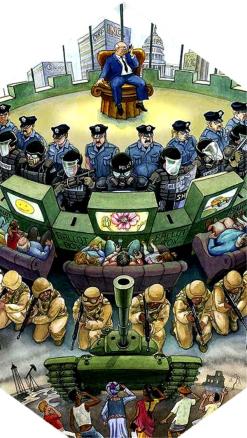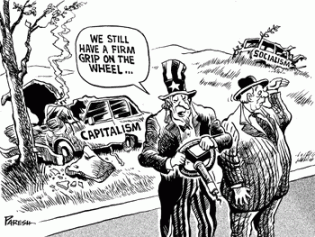Capitalism is the name of the power structure that currently dominates all human society, and which has done so for the last 500 years. It is a system based on ecological and social exploitation for the profit of the wealthy few. I sometimes refer to it as a “global system of abuse” because our relationship with capitalism is based on violence and submission, even though the system would like us to believe that it has our best interests at heart.
 Capitalism puts tremendous pressure on all of us to make money in order to survive. Hospitals, schools, prisons, “non-profit organizations,” and every other institution must conform to the profit motive, or be swallowed up.
Capitalism puts tremendous pressure on all of us to make money in order to survive. Hospitals, schools, prisons, “non-profit organizations,” and every other institution must conform to the profit motive, or be swallowed up.
In the process, life under capitalism is increasingly one of work, consumption, debt, isolation, and emotional and spiritual emptiness. We are losing connection with the two most vital sources of meaning in our lives: community with other people, and communion with nature.
Since 2008, capitalism has suffered a shock, as the system rams up against the ecological and social limits to growth. Ecological limits to growth include peak oil, other resource scarcities from water to uranium, and the effects of global warming. Social limits reside in the rebellious actions of people all over the world, most visibly manifest in last year’s Arab Spring and Occupy Wall St.
Quite simply, the sustainability of capitalism is being directly challenged, both by the Earth and by the efforts of millions of people who demand a better world. Like a shark, capital cannot survive without constantly moving, and motion requires growth. But growth, in this world of unmovable limits, is history.
So, while we live under a capitalist order, we likely will not for long. In fact, capitalism may have already died, and transformed itself into a zombie-capitalism which is content to cannibalize its own support structure in a self-defeating effort to produce short-term profits. We can see this zombie behavior through the austerity measures facing us right now – cutting social services and budgets, laying off employees, destroying public sector unions, closing schools and hospitals, and generally destroying any possibility for consumption to stay at its currently high levels.
As the economy decomposes, the good news is that new worlds which are currently closed to us may indeed open up. It may become possible to build on a larger scale what the Occupy movement attempted to do in city squares this past Fall – create spaces for people to come together, feed one another, house one another, and decide our fate democratically.
The future may be better than capitalism, or worse, but it will most certainly be different. I hope for a world where people and ecosystems matter more than profit. To get to that world, we first need to understand how capitalism structures our world currently, and how we can overcome it.
On February 1, 2012, I spoke on the topic, “What is Capitalism?” alongside George Caffentzis. The audio of our talks can be found here. The video of my talk is also here, and below that you’ll find my outline. Please take a look/listen and let me know what you think by emailing alex@endofcapitalism.com.
Thanks!
Part 2:
What is Capitalism?
“Know Your Enemy” – Rage Against the Machine
2/1/2012 – LAVA
Alex Knight, endofcapitalism.com
- Capitalism is a Global System of Abuse
- Common Sense Radicalism – speak to the core issue in a way everyone can emotionally understand
- How does it feel to live in a capitalist system? Like an abusive relationship.
- “The problem that has no name.”
- Social and ecological trauma
- BP Oil Disaster demonstrates system’s logic: profit over all, total lack of accountability
- Power, Abuse, Resistance
- Power-Over and Power-With
- Internalized Oppression vs. Inherent Need for Self-determination
- Systems of Abuse/Oppression: Patriarchy, White Supremacy, Class
- Some Features of Class Societies:
- Inequality – the few benefit at the expense of the many
- Economic production disconnected from human need
- Forced labor – slavery, wage slavery
- State violence – punishment, repression
- Warfare, Conquest
- Propaganda
- Unsustainable ecological abuse
- Popular resistance
- Capitalism is the most advanced Class Society
- Capitalism: Pyramid of Accumulation
- Financial Speculation
- Commodity Trading, Commodities
- Wage Labor, Wage Labor, Wage Labor
- Enclosures: the largest, but invisible part of the iceberg
- any energy, resources or labor taken by force or without just compensation
- Stages of Capitalism: 1492 – Present
- Mercantile Capitalism (1492-1793)
- Land Enclosures – displacement of European small farmers
- Colonization, Genocide
- Slavery
- Witch Hunts – attack on women
- Industrial Capitalism (1793-1971)
- Fossil fuel
- Mechanized production – Richard Arkwright’s steam-powered factories
- World War
- Welfare state – rising living standards in the Global North
- Neoliberalism (1971-2008)
- Globalization – industry moves to the Global South, elimination of all trade barriers
- Privatization/Deregulation – attack on welfare, rise of nonprofit industrial complex, prison industrial complex, “Structural Adjustment”
- Computerization – extreme isolation of the individual
- Astronomical Debt – rise of credit card industry, student loans, housing bubble
- Zombie Capitalism? (2008-Present)
- Neoliberalism is dead. Yet it walks amongst us?
- Bailouts are life support to the tune of $12 Trillion
- Austerity = cannibalism – foreclosures, unemployment, cutting services, wages, benefits, retirement, etc. destroy the basis for the massive consumption propping up the global economy
- Mercantile Capitalism (1492-1793)
- The Addiction Dilemma
- “Leave it with me and it will kill me. Take it from me and I will die.”
- Self-Hatred is the psychological norm under capitalism
- Addiction is a response to Trauma – stress, abuse, deprivation and displacement
- A social disease, not a personal failing
- Self-destruction vs. self-sufficiency
- The Need for Growth
- The system’s greatest strength is also its greatest weakness
- Inevitability of Crisis – the Shark
- The Profit Motive and the necessity of a return

- The End of Capitalism
- Ecological Limits to Growth: peak oil, peak uranium, peak water, peak food, peak transport, etc.
- Social Limits: resistance of everyday people, everywhere. Arab Spring, Occupy, Chinese workers.
- Recovery, Relapse, or Revolution?
Recommended Readings:
- Federici, Silvia. Caliban and the Witch: Women, The Body and Primitive Accumulation. Autonomedia 2004.
- Freire, Paulo. Pedagogy of the Oppressed. 1967.
- Heinberg, Richard. The End of Growth. New Society 2011.
- Klein, Naomi. The Shock Doctrine: The Rise of Disaster Capitalism. 2007.
- Maté, Gabor. In the Realm of Hungry Ghosts: Close Encounters with Addiction. 2008.
- Mies, Maria. Patriarchy and Accumulation on a World Scale. Zed Books 1986.
- Turbulence. “Life in Limbo?” Vol. 5, December 2009. http://www.turbulence.org.uk
Alex Knight is the editor of endofcapitalism.com and is writing the coincidentally named book “The End of Capitalism,” which argues that the global capitalist system is breaking down due to ecological and social limits to growth, and we are transitioning to a noncapitalist future. Alex was active in the new Students for a Democratic Society (SDS) from 2006-2009, and now spends most of his time organizing with the wonderful people of Occupy Philadelphia.
Next: Part 3. Why is it Breaking Down?
Synopsis Outline:




Recent Comments